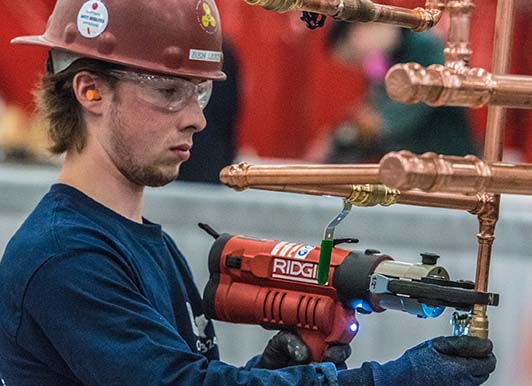Industrial Control
What is industrial control?
Automation and control technicians may work on almost anything, from home appliances to the three hundred horsepower motors that run conveyor belts in factories. They need to have knowledge of the basic electrical theory related to motors and wire calculations, an understanding of commercial and industrial wiring methods, and be aware of the rules and regulations of the Electrical Safety Code in everything they do. They are faced with challenges that involve the use of programmable logic controllers, computers and IP technology.
An aptitude for mathematics and an eye for detail will serve you well in this field. You should be able to work well with others since you will often be part of a team, but also be able to work independently and take initiative when necessary. Excellent communication and analytical skills, adaptability, flexibility and knowledge of computers are important. You need to be able to read, interpret and understand complex diagrams, so good reading and writing abilities are required. If you are interested in electricity and how it works, you might enjoy working in electric motor control.
Industrial controllers perform some or all of the following duties:
- Manufacturing controlling
- Product cost calculations and analysis
- Budget forecasting
- Reporting
- Electrical wiring assessments
- Interpreting diagrams
- Electrical wiring
HOW TO JOIN THE FIELD
Completion of secondary school is usually required.
College courses in automation and control are usually required.
Several years of on-the-job training are usually provided.
Set-up persons, inspectors and lead hands in this unit group may require experience as an assembler, fitter or wirer in the same company.
INDIGENOUS AND REMOTE CONSIDERATIONS
Indigenous and remote communities are catching up to southern Canada when it comes to digital technology and computer skills and industries. Not all communities have access to reliable, affordable internet and service interruptions are all too common. Access to computers at home is not a given for everyone and Elders and even sometimes younger generations lack computer knowledge, although this situation is undergoing some significant changes at the moment. But even those people in Indigenous and remote communities with interest and high-level skills in computers may not have the same access to opportunities to learn about different programs and may face significant bandwidth issues, limiting their ability to learn and develop in this field. Indigenous and remote students may need qualifying courses or need to augment college learning to be successful in this field.
With math literacy in the north being lower than in other places, northern and remote students may need extra support in order to pass tests and get their red seal.
DISABILITY CONSIDERATIONS
With this job being heavy manual labour, it may not be possible for someone with a severe physical disability. Accommodations may be necessary for someone with a learning disability.
Find the right career path for you with our interactive map!
Trouvez le cheminement de carrière qui vous convient grâce à notre carte interactive!
Sample Job Titles
- Design and testing engineer
- Industrial motor control
- Electronic service technician
- Industrial instrument technician
- Electrical instrument inspector
- Switchgear fitter-wirer
- Transformer inspector
- Transformer winder
- Instrumentation control
- Automation engineer
Companies and Sectors
- Automation and control companies
- Manufacturing companies
- Technology companies
- Government

Industrial Control and the Skills for Success Program
The key Skills for Success for this career path are:
- Digital
- Problem Solving
- Communication



